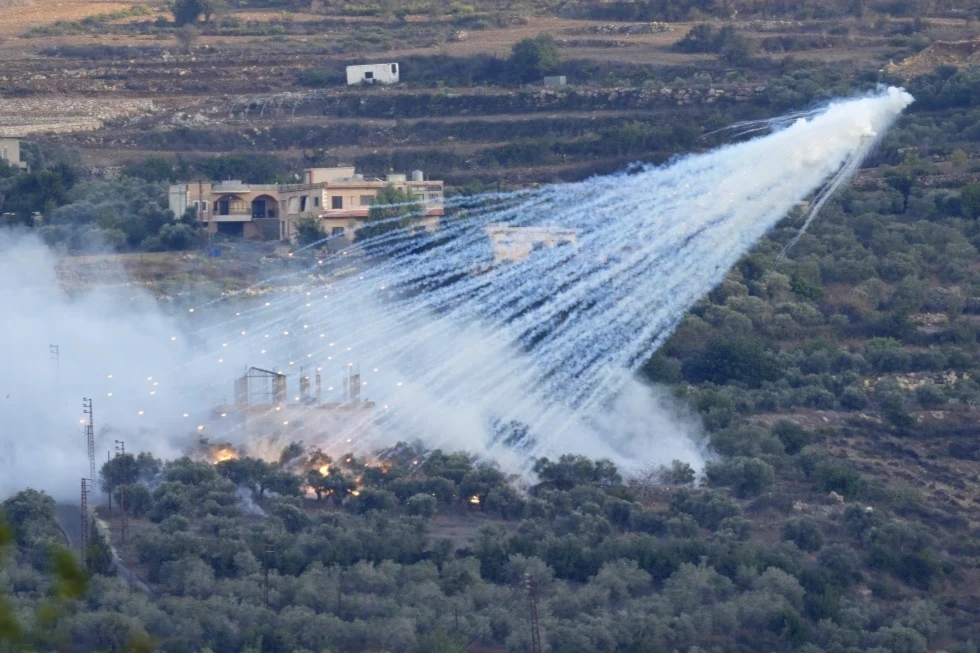Environmental consequences of 'Israel’s' urbicidal war on Lebanon
The mass destruction caused by the Israeli aggression poses a silent long-term risk to civilian health and the environment.
-

A shell that appears to be white phosphorus from Israeli artillery explodes over a house in al-Bustan, a Lebanese village along the border with occupied Palestine, October 15, 2023. (AP)
The ongoing war waged by the Israeli occupation against Lebanon has inflicted severe environmental damage, compounding the humanitarian and infrastructural toll. Characterized by what experts describe as an urbicidal strategy, that is, deliberate targeting of urban centers, the war has devastated ecosystems, poisoned water sources, and scorched agricultural lands across southern Lebanon.
Ali Hammoud Chit straddles the rubble of his pre-war life. His multi-storey home in Kfar Kila, near the border with occupied Palestine, has been ravaged by relentless Israeli bombing.
"No, we can't live anywhere else," he says. "Will there be another war? Maybe, we're used to it."
According to authorities, 90% of Kfar Kila was destroyed between October 8, 2023, and March 25, 2025. Even after the ceasefire agreement, the area remained under occupation, with 57 people killed during that period.
The devastation in Lebanon parallels “Israel’s” brutal assault on Gaza. The International Court of Justice has ordered the Israeli occupation to refrain from acts of genocide.
Urbicidal tactics, destruction of infrastructure
Most Israeli bombardments were concentrated in the south and west of Lebanon, and at times, in the Southern Suburb of Beirut.
In mid-September 2024, “Israel” escalated its campaign with booby-trapped walkie-talkies, killing and injuring dozens. From September 23 onward, the occupation intensified its assault, targeting both southern Lebanon and the capital’s outskirts, pushing the country into a full-scale war.
Since the ceasefire came into effect on November 27, 2025, Israeli forces have violated Lebanese sovereignty over 3000 times, according to various local monitoring sources.
These breaches include approximately 1,500 ground incursions, 1,435 aerial violations, and 73 maritime infractions. The ongoing Israeli attacks and violations have resulted in the martyrdom of 149 people and left 346 others injured, further escalating tensions in the region.
Despite an "official withdrawal" in mid-February, Israeli soldiers continue to operate from five positions inside Lebanese territory.
'We're doing what we can to protect ourselves'
A towering wall erected by the occupation separates Kfar Kila from the rest of occupied Palestine. On his damaged property, Ali Hammoud Chit steps through masses of scrap metal and broken concrete. “We’re doing what we can to protect ourselves,” he says.
According to CNRS, “Israeli” forces adopted an urbicidal military strategy, deliberately destroying civilian infrastructure through heavy bombardment and planted explosives.
An urbicidal military strategy refers to the deliberate targeting and destruction of urban environments, cities, infrastructure, and civilian spaces as a tactic of war. The goal is not just military defeat but the systematic erasure of a community’s physical, cultural, and social fabric.
Hadi Awada, an organic farmer in Kfar Kila, shares concerns, "People are already selling materials like iron and aluminium. But for other waste like stones, we're afraid it will be polluted with toxic materials."
Overhead, Israeli drones buzz the skies as daily life attempts to resume.
Recycling dilemma, landfill politics
Former Public Works Minister Ali Hamieh proposed reusing war debris for coastal embankment projects, an idea criticized by environmentalists.
"Geographically, too, it's different. In 2006, most of the waste was concentrated in the suburbs of Beirut. Now it's also in the south, where around a hundred villages have been crushed. The situation is much more serious," says the waste management specialist.
As of now, rubble from southern Beirut and Mount Lebanon is temporarily held at the Jdeidé landfill, according to L'Orient-Le Jour. It is expected to be transferred to the Costa Brava landfill, south of Beirut, once expansion work there is complete.
Lebanon’s new Environment Minister, Tamara Elzein, estimates 32 million tons of rubble have accumulated since the war began. A World Bank estimate from November 2024 suggests the number could reach up to 100 million tons.
The French National Center for Scientific Research (CNRS) estimates that 2–4 million tons of rubble were created in southern Beirut alone due to daily bombardment between September and November 2024.
Calls for sustainable reconstruction, local resilience
Despite government-issued circulars calling for debris sorting and environmentally conscious recycling, experts say enforcement is lacking.
"There is no clear monitoring mechanism to guarantee effective sorting and recycling," says Yara Khalek, researcher at Public Works Studio.
In response, civil society has launched a petition demanding urgent action: toxic waste analysis, proper sorting , environmentally safe storage, job creation, and the development of new recycling technologies.
In the Southern Suburb of Beirut, as in the villages of South Lebanon, everyone is trying to get organized to clear away the debris and erase the traces of this new form of war.
“Recycling and reusing this waste can support sustainable reconstruction, as local communities, government authorities, and experts work to restore both the environment and the economy,” stresses Hisham Younes, president of The Green Southerners Association.
This is also the approach advocated by Riad al-Assaad, engineer and director of South for Construction.
“To bring life back to a village, it's not enough just to bring in cardboard boxes,” he said. "We need to recycle debris locally, give it value and involve local people in the process."
“You have to think about all the other aspects, such as activities, agriculture.”
From 2006 to 2025: A repeating crisis
In Kfar Kila, the weight of history repeats itself. Amid bulldozer tracks and shattered olive groves from Israeli aggression, Ali Hammoud Chit rebuilds what he can. “There were great olive trees, a hundred years old or more: they uprooted everything, broke it all.”
Nearby, his family’s only surviving animal, a dromedary named Jamal, grazes quietly, alive amid the wreckage of war.

 6 Min Read
6 Min Read








